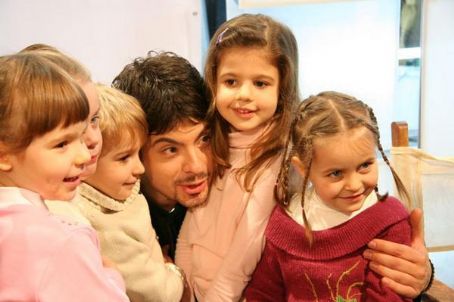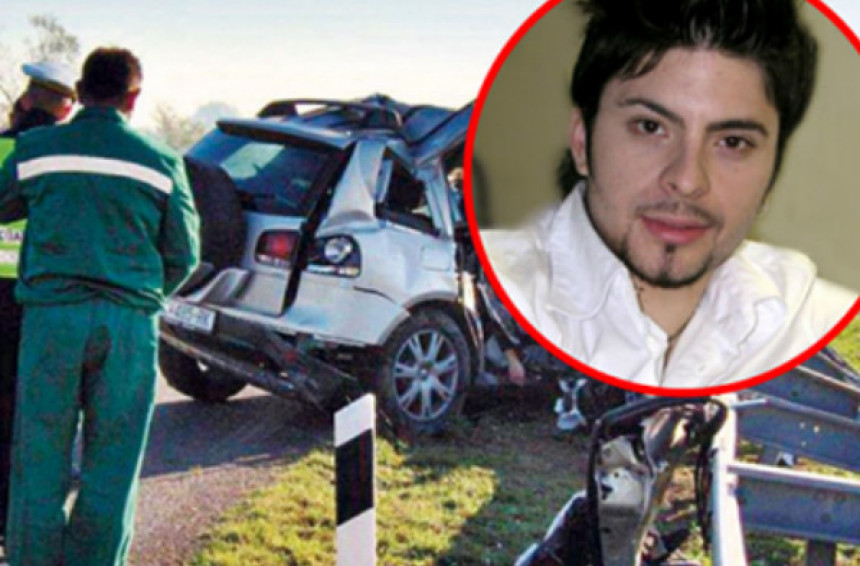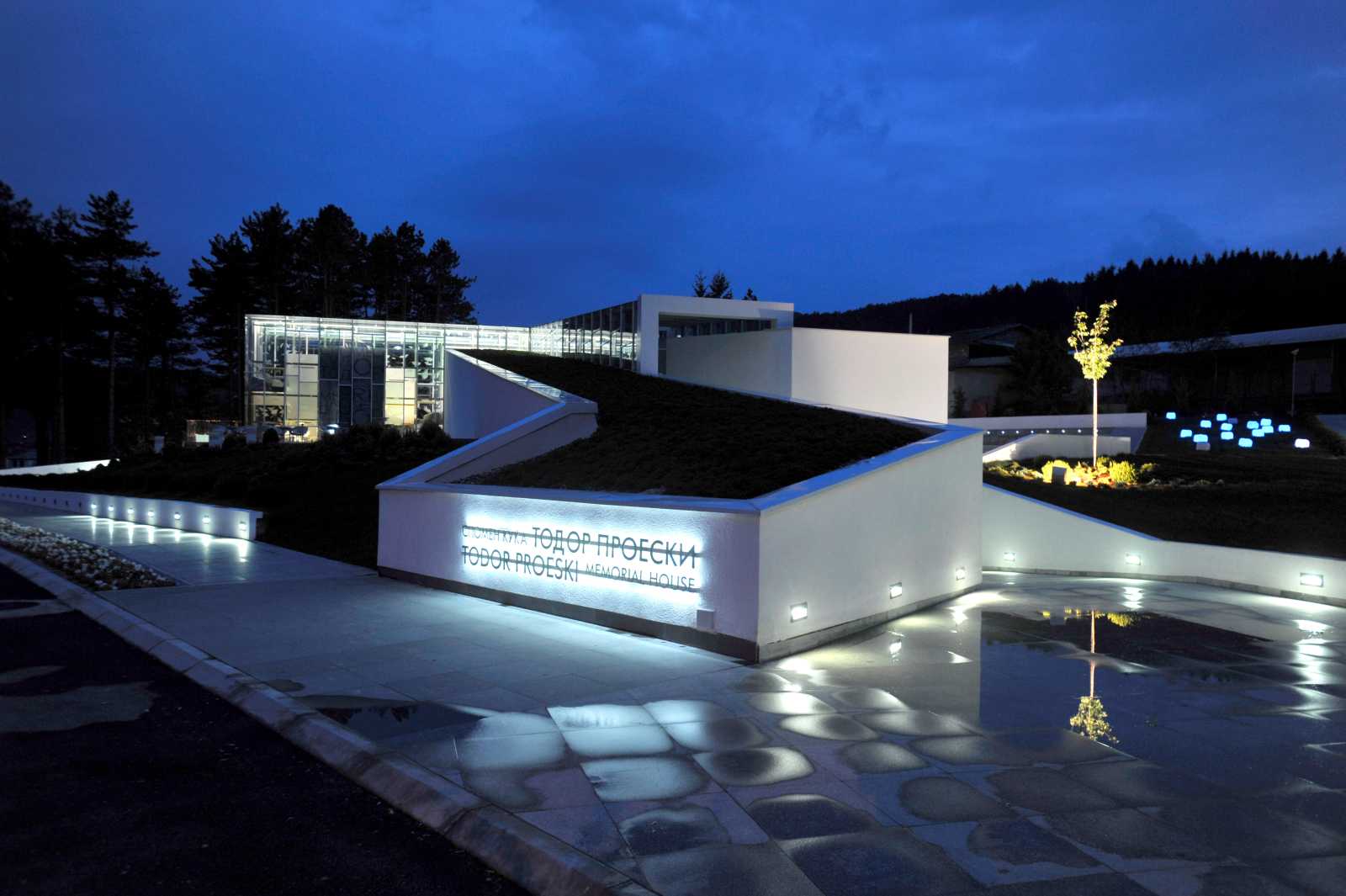In the final, Macedonia had a slightly worse outcome with 47 points, with Serbia and Montenegro again giving Tose their 12 points.
Macedonia came 14th in the final, their best result overall at the time.
The release of the song 'Life' gave him his first ever charting outside of Eastern Europe, when it reached #49 in South Africa.
UNICEF
In 2004, Tose was named a UNICEF Goodwill Ambassador, and recorded the song "This World" which then became the official anthem of UNICEF, along with John Lennon's Imagine.

After Proeski's death, Unicef said that “The children of the country (North Macedonia) have lost a sincere friend in Tose Proeski. Not only did he entertain children with his magical voice, he also spoke out for them and with them. He was his country’s National Ambassador who advocated tirelessly for children.”
Final albums
For his next album, Po tebe, Tose signed a contract, so that it could be released in Croatian and Slovenian. In order to establish himself on the Croatian-Slovenian stage, he recorded "Krajnje vreme" with Slovenian singer, Anja Rupel. Po tebe is now one of the most popular albums in the Balkans, topping music charts in Macedonia, Serbia, Croatia, Slovenia and Bosnia/Herzegovina.
Tose's final album, Igri bez granici, or Games without Borders, was released on August 2007.
Tose's last concert was held on 5 October 2007 for the Primary Education Project for USAID. (See title photo.) The concert raised tens of thousands of euros for the primary schools of Macedonia. The concert was attended by over 40,000 people and viewed all over the world.
Proeski's final interwiew was for Macedonian TV network Kanal 5, and can be viewed on Youtube.
Death
On the A3 motorway in Croatia during the early morning of 16 October 2007, Proeski died in a car crash while he was asleep in the front passenger seat of a VW Toureg driven by Georgij Georgijevski.

Above is the car after the crash.
State Funeral
Proeski's body arrived at midnight in Skopje by a Macedonian army helicopter. It was then transported by car to Krusevo, where he grew up.
The US embassy in Skopje paid their respects:
"It is with immense shock and sadness that I learned today of the death of Tose Proeski. My family and I, and the entire US Embassy extend our deepest condolences to Tose’s friends, family and the Macedonian people. You are all in our thoughts and our prayers.
Tose touched countless lives in his time with us and provided an excellent example of how much good one person can accomplish. His music and the joy it gave to millions, and the broader inspiration he provided, particularly to young people, live on as a lasting legacy. We were honored to work with him on several projects and marveled at the energy he brought to everything he did. Tose Proeski packed a lifetime of music and joy and caring for others into his far too short life. We mourn his passing but are thankful for all he accomplished and for all that he gave to anyone who encountered him.
The loving response that always greeted Tose, whether from a stadium filled with thousands or a small child giving him a stuffed animal gift, was a reflection of Tose’s own love – of life, of music, of his public and of his country.
His family, but also Macedonia, has lost an exceptional son."
17 October 2007 was then pronounced a national day of mourning in Macedonia.
The three days following his death were pronounced days of mourning in the City of Krusevo.
On 17th October, the government organized an official state funeral for Proeski, which included military honour ceremonies by the Ceremonial Guard Battalion of the Macedonian Army (personnel of which conducted an honorary rifle salute) and a military band. The funeral, which was broadcast by MPT, was attended by many delegations from both Macedonia and beyond, including the President Branko Crvenkovski, the Prime Minister Nikola Gruevski, members of the Macedonian Parliament and its President Ljubiša Georgievski and other high-ranking officials, diplomats, representatives of the Red Cross and other organizations. The funeral was also attended by many notable musicians from Macedonia and other countries, including:
Karolina Gočeva, Kaliopi, Vlado Janevski, Lambe Alabakoski, Elena Risteska, Jovan Jovanov, Martin Vučić, Adrian Gaxha, Tijana Dapčević and her sister Tamara Todevska, Aki Rahimovski (the frontman of Parni valjak), Toni Cetinski, Ceca Ražnatović, Željko Joksimović, Vlado Georgiev and many others.
As Proeski was an Orthodox Christian, the religious service was held by the Macedonian Orthodox Church led by the Archbishop Stephen of Ohrid.

Remembrance
From 2008 until 2012, Macedonian athlete Mile Stojkoski ran a marathon in his wheelchair from Tose's birthplace in Prilep to his grave in Kruševo. Stojkoski also ran an additional long distance marathon starting from Kruševo in honor of Toše Proeski.The two Macedonians both received the Mother Teresa Award for their humanitarian accomplishments and shared a close friendship.
An online petition was held for a tribute to be paid to Tose Proeski at the Eurovision Song Contest 2008. This was not honoured by the EBU, although one of the singers of the Macedonian act that year said that it was dedicated to a few people including their "angel who is up there watching over us."
In 2011, "Memorial House Todor Proeski" has been opened in Kruševo.
At World Architecture Festival (WAF) 2011, in Barcelona, the building won the Peoples' Choice Award as the most beautiful one in the world.

Above is the Memorial House Todor Proeski.
A memorial concert for Toše was held on 2 November 2018. It included many popular Balkan musicians and was held at the SCBT Arena.
In April 2019, the Phillip II stadium, used by the Macedonian national football team, was renamed to the Tose Proeski National Arena. The first use for it was a football match between Macedonia and Poland. The game ended 1-0 to Poland.
Final albums
For his next album, Po tebe, Tose signed a contract, so that it could be released in Croatian and Slovenian. In order to establish himself on the Croatian-Slovenian stage, he recorded "Krajnje vreme" with Slovenian singer, Anja Rupel. Po tebe is now one of the most popular albums in the Balkans, topping music charts in Macedonia, Serbia, Croatia, Slovenia and Bosnia/Herzegovina.
Tose's final album, Igri bez granici, or Games without Borders, was released on August 2007.
Tose's last concert was held on 5 October 2007 for the Primary Education Project for USAID. (See title photo.) The concert raised tens of thousands of euros for the primary schools of Macedonia. The concert was attended by over 40,000 people and viewed all over the world.
Proeski's final interwiew was for Macedonian TV network Kanal 5, and can be viewed on Youtube.
Death
On the A3 motorway in Croatia during the early morning of 16 October 2007, Proeski died in a car crash while he was asleep in the front passenger seat of a VW Toureg driven by Georgij Georgijevski.

Above is the car after the crash.
State Funeral
Proeski's body arrived at midnight in Skopje by a Macedonian army helicopter. It was then transported by car to Krusevo, where he grew up.
The US embassy in Skopje paid their respects:
"It is with immense shock and sadness that I learned today of the death of Tose Proeski. My family and I, and the entire US Embassy extend our deepest condolences to Tose’s friends, family and the Macedonian people. You are all in our thoughts and our prayers.
Tose touched countless lives in his time with us and provided an excellent example of how much good one person can accomplish. His music and the joy it gave to millions, and the broader inspiration he provided, particularly to young people, live on as a lasting legacy. We were honored to work with him on several projects and marveled at the energy he brought to everything he did. Tose Proeski packed a lifetime of music and joy and caring for others into his far too short life. We mourn his passing but are thankful for all he accomplished and for all that he gave to anyone who encountered him.
The loving response that always greeted Tose, whether from a stadium filled with thousands or a small child giving him a stuffed animal gift, was a reflection of Tose’s own love – of life, of music, of his public and of his country.
His family, but also Macedonia, has lost an exceptional son."
17 October 2007 was then pronounced a national day of mourning in Macedonia.
The three days following his death were pronounced days of mourning in the City of Krusevo.
On 17th October, the government organized an official state funeral for Proeski, which included military honour ceremonies by the Ceremonial Guard Battalion of the Macedonian Army (personnel of which conducted an honorary rifle salute) and a military band. The funeral, which was broadcast by MPT, was attended by many delegations from both Macedonia and beyond, including the President Branko Crvenkovski, the Prime Minister Nikola Gruevski, members of the Macedonian Parliament and its President Ljubiša Georgievski and other high-ranking officials, diplomats, representatives of the Red Cross and other organizations. The funeral was also attended by many notable musicians from Macedonia and other countries, including:
Karolina Gočeva, Kaliopi, Vlado Janevski, Lambe Alabakoski, Elena Risteska, Jovan Jovanov, Martin Vučić, Adrian Gaxha, Tijana Dapčević and her sister Tamara Todevska, Aki Rahimovski (the frontman of Parni valjak), Toni Cetinski, Ceca Ražnatović, Željko Joksimović, Vlado Georgiev and many others.
As Proeski was an Orthodox Christian, the religious service was held by the Macedonian Orthodox Church led by the Archbishop Stephen of Ohrid.

Remembrance
From 2008 until 2012, Macedonian athlete Mile Stojkoski ran a marathon in his wheelchair from Tose's birthplace in Prilep to his grave in Kruševo. Stojkoski also ran an additional long distance marathon starting from Kruševo in honor of Toše Proeski.The two Macedonians both received the Mother Teresa Award for their humanitarian accomplishments and shared a close friendship.
An online petition was held for a tribute to be paid to Tose Proeski at the Eurovision Song Contest 2008. This was not honoured by the EBU, although one of the singers of the Macedonian act that year said that it was dedicated to a few people including their "angel who is up there watching over us."
In 2011, "Memorial House Todor Proeski" has been opened in Kruševo.
At World Architecture Festival (WAF) 2011, in Barcelona, the building won the Peoples' Choice Award as the most beautiful one in the world.

Above is the Memorial House Todor Proeski.
A memorial concert for Toše was held on 2 November 2018. It included many popular Balkan musicians and was held at the SCBT Arena.
In April 2019, the Phillip II stadium, used by the Macedonian national football team, was renamed to the Tose Proeski National Arena. The first use for it was a football match between Macedonia and Poland. The game ended 1-0 to Poland.
Tose's final album, Igri bez granici, or Games without Borders, was released on August 2007.
Tose's last concert was held on 5 October 2007 for the Primary Education Project for USAID. (See title photo.) The concert raised tens of thousands of euros for the primary schools of Macedonia. The concert was attended by over 40,000 people and viewed all over the world.
Proeski's final interwiew was for Macedonian TV network Kanal 5, and can be viewed on Youtube.
The US embassy in Skopje paid their respects:
"It is with immense shock and sadness that I learned today of the death of Tose Proeski. My family and I, and the entire US Embassy extend our deepest condolences to Tose’s friends, family and the Macedonian people. You are all in our thoughts and our prayers.
Tose touched countless lives in his time with us and provided an excellent example of how much good one person can accomplish. His music and the joy it gave to millions, and the broader inspiration he provided, particularly to young people, live on as a lasting legacy. We were honored to work with him on several projects and marveled at the energy he brought to everything he did. Tose Proeski packed a lifetime of music and joy and caring for others into his far too short life. We mourn his passing but are thankful for all he accomplished and for all that he gave to anyone who encountered him.
The loving response that always greeted Tose, whether from a stadium filled with thousands or a small child giving him a stuffed animal gift, was a reflection of Tose’s own love – of life, of music, of his public and of his country.
His family, but also Macedonia, has lost an exceptional son."
17 October 2007 was then pronounced a national day of mourning in Macedonia.
The three days following his death were pronounced days of mourning in the City of Krusevo.
On 17th October, the government organized an official state funeral for Proeski, which included military honour ceremonies by the Ceremonial Guard Battalion of the Macedonian Army (personnel of which conducted an honorary rifle salute) and a military band. The funeral, which was broadcast by MPT, was attended by many delegations from both Macedonia and beyond, including the President Branko Crvenkovski, the Prime Minister Nikola Gruevski, members of the Macedonian Parliament and its President Ljubiša Georgievski and other high-ranking officials, diplomats, representatives of the Red Cross and other organizations. The funeral was also attended by many notable musicians from Macedonia and other countries, including:
Karolina Gočeva, Kaliopi, Vlado Janevski, Lambe Alabakoski, Elena Risteska, Jovan Jovanov, Martin Vučić, Adrian Gaxha, Tijana Dapčević and her sister Tamara Todevska, Aki Rahimovski (the frontman of Parni valjak), Toni Cetinski, Ceca Ražnatović, Željko Joksimović, Vlado Georgiev and many others.
As Proeski was an Orthodox Christian, the religious service was held by the Macedonian Orthodox Church led by the Archbishop Stephen of Ohrid.

Remembrance
From 2008 until 2012, Macedonian athlete Mile Stojkoski ran a marathon in his wheelchair from Tose's birthplace in Prilep to his grave in Kruševo. Stojkoski also ran an additional long distance marathon starting from Kruševo in honor of Toše Proeski.The two Macedonians both received the Mother Teresa Award for their humanitarian accomplishments and shared a close friendship.
An online petition was held for a tribute to be paid to Tose Proeski at the Eurovision Song Contest 2008. This was not honoured by the EBU, although one of the singers of the Macedonian act that year said that it was dedicated to a few people including their "angel who is up there watching over us."
In 2011, "Memorial House Todor Proeski" has been opened in Kruševo.
At World Architecture Festival (WAF) 2011, in Barcelona, the building won the Peoples' Choice Award as the most beautiful one in the world.





